Reserve Bank of Australia Annual Report – 2019 International Financial Cooperation
The Reserve Bank participates in initiatives that seek to address the challenges facing the international economy and improve the global financial architecture. It does so through its membership of global and regional forums and its close bilateral relationships with other central banks.
Group of Twenty (G20)
Purpose
The G20 facilitates international cooperation on economic, financial and other policy issues among 19 country members – including Australia – from all regions of the world, as well as with the European Union, International Monetary Fund (IMF) and other international organisations.
Reserve Bank Involvement
The Reserve Bank is represented at high-level meetings of the G20 by the Governor and Assistant Governor (Economic), while other senior staff participate in select G20 working groups and contribute to the G20's financial regulation reform agenda.
The G20 presidency was held by Argentina from December 2017 to December 2018. In January 2019, the G20 presidency rotated to Japan. A key theme of the Japanese presidency is ageing, with a focus on understanding the macroeconomic implications of demographic change and identifying appropriate policy responses. Another important theme has been monitoring of global imbalances – that is, persistent and excessive current account deficits and surpluses – and identifying possible policy measures to respond to them. Japan has continued the G20's work on promoting private investment in infrastructure, but with a focus on the quality of infrastructure investment. This work was advanced by the G20's Infrastructure Working Group, which is co-chaired by the Australian Treasury.
The G20 has also continued to discuss how to strengthen the international monetary system. This discussion has been aided by a report by the G20 Eminent Persons Group, which was a focus of the G20 Ministers' and Governors' meeting in October 2018. The G20 has reiterated its commitment to a strong, quota-based and adequately resourced IMF at the centre of the global financial system. Accordingly, the G20 has committed to complete a review of the IMF's permanent ‘quota’ resources by late 2019. The G20 has also continued to monitor the risks stemming from excessive volatility in capital flows, as well as how to promote the transparency and sustainability of sovereign debt.
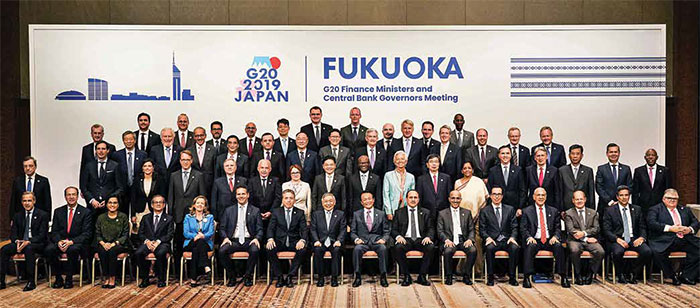
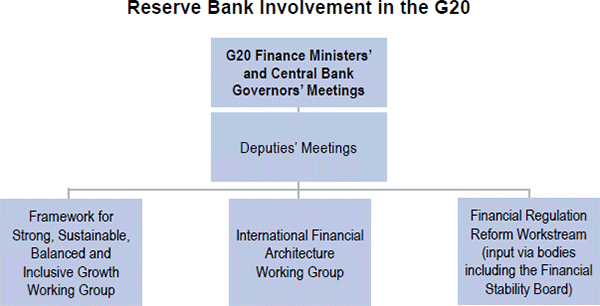
The G20 continues to pursue the full, timely and consistent implementation of the financial sector reforms developed and agreed after the global financial crisis, such as Basel III (to build resilient financial institutions). With many of these policy reforms now largely implemented, the G20 and Financial Stability Board (FSB) have shifted their focus away from post-crisis policy development and implementation, to assessing the effectiveness of the reforms. This work aims to determine if the reforms are meeting their intended objectives and whether there have been any material adverse consequences. The G20, in conjunction with the FSB and the global standard-setting bodies, also continues to monitor and address current vulnerabilities in the financial system (such as banks' exposures to leveraged loans), as well as medium-term emerging risks. The latter has included monitoring of developments in financial technology (‘fintech’), including crypto-assets and, where necessary, responding to the risks posed. The Reserve Bank, along with other Council of Financial Regulators (CFR) agencies, continues to work with overseas counterparts on these and other global regulatory issues.
Financial Stability Board (FSB)
Purpose
The FSB promotes international financial stability by coordinating national financial sector authorities and international standard-setting bodies as they work towards developing strong regulatory, supervisory and other financial sector policies. It also plays a central role in assessing new and evolving trends and risks.
FSB members include representatives from 24 economies as well as the main international financial institutions – including the Bank for International Settlements (BIS) and the IMF – and standard-setting bodies such as the Basel Committee on Banking Supervision (BCBS).
Reserve Bank Involvement
The main decision-making body of the FSB is the Plenary. The Governor is a member of the Plenary, as well as the Steering Committee and the Standing Committee on Assessment of Vulnerabilities. The Governor also continued to serve as co-Chair of the Regional Consultative Group for Asia until his term ended on 30 June 2019.
Senior staff members of Financial Stability Department participate in meetings of the:
- Analytical Group on Vulnerabilities, which supports the work of the Standing Committee on Assessment of Vulnerabilities
- Resolution Steering Group (until June 2019)
- Financial Innovation Network.
As noted above, while the FSB has continued to pursue regulatory reform of the global financial system, its focus has shifted in recent years from policy design and implementation monitoring, to evaluating the effects of the post-financial crisis reforms.[1] Initial evaluation work examined the effects of reforms on the incentives to centrally clear over-the-counter derivatives, and on infrastructure financing. Further evaluations are under way, looking at the effects of reforms on financing for small and medium-sized enterprises, and the ‘too big to fail’ reforms. A representative of Financial Stability Department is a member of the ‘too big to fail’ evaluation team.
The Standing Committee on Assessment of Vulnerabilities is the main FSB body for identifying and assessing risks in the global financial system. Supporting this committee are the Analytical Group on Vulnerabilities and the Financial Innovation Network, which provides input on the financial stability implications of financial innovation (such as fintech and cloud services). Global vulnerabilities recently considered by the Standing Committee have included high private and public debt, elevated asset values and weaker lending standards. It has also examined risks in particular markets and products. This has included highlighting concerns about the extent of financial institutions' exposures to riskier credit instruments, such as leveraged loans, both directly and through collateralised loan obligations. The Standing Committee is currently seeking to develop a clearer framework for the assessment of vulnerabilities. This should support a comprehensive, methodical and disciplined assessment of new and emerging risks to financial stability. The Assistant Governor (Financial System) is leading one of the work streams contributing to the new framework, exploring the features of a well-defined surveillance process.
The FSB has continued its work on addressing the risks posed by non-bank financial intermediation (NBFI) (previously referred to as ‘shadow banking’). This refers to credit provision involving entities and activities outside of the regular banking system. A key part of this work is an annual global monitoring exercise, which collects data on NBFI sectors within FSB and several non-FSB jurisdictions. The Reserve Bank is represented on the FSB's Non-bank Monitoring Experts Group (previously known as the Shadow Banking Experts Group), which conducts this monitoring exercise and associated risk analysis.
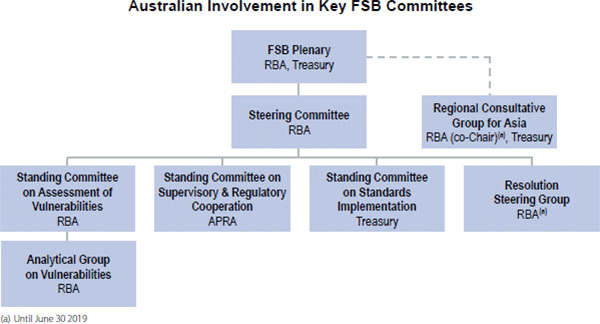
Reserve Bank staff members also took part in a number of other key FSB work areas during 2018/19, including meetings of the:
- Resolution Steering Group, which is progressing the FSB's work on enhancing resolution frameworks in line with international standards. Its recent policy focus has included: the adequacy of resources for central counterparty resolution; the arrangements for external and internal total loss-absorbing capacity at banks; and continuity of access to financial market infrastructures for a bank in resolution. The Resolution Steering Group also serves as an important forum to exchange information about resolution experience. The Australian Prudential Regulation Authority (APRA) took over Australia's membership of this group in June 2019.
- Cross-border Crisis Management Group for Financial Market Infrastructures, a subgroup of the Resolution Steering Group working on resolution arrangements for central counterparties and other financial market infrastructures.
- Official Sector Steering Group, which is progressing reforms of interest rate benchmarks, including coordinating the transition away from LIBOR (the London Inter-Bank Offered Rate) towards alternative interest rate benchmarks.
- Regional Consultative Group for Asia, one of six regional groups established to expand the FSB's outreach activities with non-member economies and to examine issues relevant for the region.
As a member of several FSB committees, the Reserve Bank hosts committee meetings from time to time. It hosted meetings in Sydney of the Regional Consultative Group for Asia (November 2018), and of the Non-bank Monitoring Experts Group (March 2019).
Bank for International Settlements (BIS)
Purpose
The BIS and its associated committees play an important role in supporting collaboration among central banks and other financial regulatory bodies. They do so by bringing together officials to exchange information and views about the global economy, vulnerabilities in the global financial system and other issues affecting the operations of central banks.
Reserve Bank Involvement
The Reserve Bank is one of 60 central banks holding shares in the BIS. The Governor or Deputy Governor attends the bimonthly meetings of governors and participates in meetings of the Asian Consultative Council. The Governor chairs the Committee on the Global Financial System, and the Assistant Governor (Financial Markets) is a member of the Markets Committee and the Committee on the Global Financial System.
The Committee on the Global Financial System seeks to identify potential sources of stress in the global financial system and promotes the development of well-functioning and stable financial markets. During 2018/19, the committee's discussions included: global financial vulnerabilities amid downward revisions to the outlook for global growth and risks related to political and trade tensions; the development of resilient capital markets; and financial stability implications of scenarios in which interest rates globally remain low for an extended period or move unexpectedly higher. The Markets Committee considers how economic and other developments, including regulatory reform and technological change, may affect financial markets, particularly central bank operations. Recent topics of discussion have included: changes in how monetary policies have been implemented and how this interacts with financial markets; implications of reforms to benchmark interest rates; and how technological change is affecting the structure of financial markets and central bank operations.
During 2018/19, Reserve Bank staff participated in a number of working groups of the Markets Committee and Committee on the Global Financial System, including:
- a Committee on the Global Financial System working group on establishing viable capital markets, which published its final report in January 2019
- a Committee on the Global Financial System study group on property price dynamics.
Basel Committee on Banking Supervision (BCBS)
Purpose
The BCBS is hosted by the BIS and is the international standard-setting body for the banking sector. It provides a forum for regular cooperation on banking supervisory matters among its 28 member jurisdictions. It seeks to enhance understanding of key supervisory issues and improve the quality of banking supervision worldwide.
Reserve Bank Involvement
The Governor is a member of the Group of Governors and Heads of Supervision, which is the oversight body for the BCBS. The Assistant Governor (Financial System) is a member of the BCBS. A Deputy Head of Financial Stability Department is a member of the Macroprudential Supervision Group.
Over the year in review, the Group of Governors and Heads of Supervision (GHOS) endorsed revisions to the BCBS market risk framework, which had been a major area of work in the past year, and which take effect from 2022. The BCBS also considered interest-rate benchmark reforms, aspects of the Basel III leverage ratio requirement, banks' exposures to crypto-assets and associated risks, and the results of the annual global systemically important banks (G-SIBs) identification exercise (see below). GHOS also endorsed the BCBS's strategic priorities and work program for 2019, which include: finalising ongoing policy reforms; ensuring full, timely and consistent implementation of the BCBS's post-crisis reforms; evaluating and monitoring the impact of the post-crisis reforms; assessing emerging risks; and promoting strong supervision.
The Macroprudential Supervision Group focuses on policies designed to address systemic risks arising from the banking sector, especially those posed by G-SIBs. The group discussed several issues during 2018/19, including: the annual G-SIB assessment exercise, which underpins the list of G-SIBs identified by the FSB; the next three-year review of the G-SIB identification methodology; and the experience with, and effectiveness of, the Basel III counter-cyclical capital buffer.
Committee on Payments and Market Infrastructures (CPMI)
Purpose
The CPMI is hosted by the BIS, and serves as a forum for central banks to monitor and analyse developments in payment, clearing and settlement infrastructures and sets standards for them. It has members from 28 central banks.
Joint working groups of the CPMI and the International Organization of Securities Commissions (IOSCO) bring together members of these two bodies to coordinate policy work on the regulation and oversight of financial market infrastructures.
Reserve Bank Involvement
Staff members from Payments Policy Department are members of the CPMI, CPMI-IOSCO Steering Group, CPMI-IOSCO Implementation Monitoring Standing Group and CPMI-IOSCO Policy Standing Group. The Head of Payments Policy Department is chair of the CPMI's RTGS (Real-time Gross Settlement) Working Group, which includes a staff member from Payments Settlements Department as a participant. Staff members in Payments Policy Department participate in the CPMI's Working Group on Digital Innovations and a Payments Settlements Department staff member participates in a task force on wholesale payments security.
Staff members from Payments Policy Department contributed to a number of CPMI-IOSCO implementation monitoring reports that were published in 2018/19. Staff also contributed to a CPMI-IOSCO Policy Standing Group discussion paper on default management auctions.
Cooperative Oversight Arrangements
Purpose
Several overseas-based financial market infrastructures hold Australian clearing and settlement facility licences, for which the Reserve Bank has certain regulatory responsibilities under the Corporations Act 2001. An overseas-based payments system also plays an important role in Australia's financial system. The Reserve Bank participates in several multilateral and bilateral arrangements to support its oversight of these financial market infrastructures, as set out below.
Reserve Bank Involvement
Staff from Payments Policy Department participated in:
- an arrangement led by the Federal Reserve Bank of New York to oversee CLS Bank International, which provides a settlement service for foreign exchange transactions
- a global oversight college and a crisis management group for LCH Limited, both chaired by the Bank of England
- an information-sharing arrangement with the US Commodity Futures Trading Commission, in relation to CME Inc.
- the Society for Worldwide Interbank Financial Telecommunication (SWIFT) Oversight Forum, chaired by the National Bank of Belgium.
International Monetary Fund (IMF)
Purpose
The IMF oversees the stability of the international monetary system via:
- bilateral and multilateral surveillance, which involves monitoring, analysing and providing advice on the economic and financial policies of its 189 members and the linkages between them – Article IV consultations, which are a key means to do this, are conducted for Australia every year
- the provision of financial assistance to member countries experiencing actual or potential balance of payments problems.
Reserve Bank Involvement
Australia holds a 1.39 per cent quota share in the IMF and is part of the Asia and the Pacific Constituency, which is represented by one of the IMF's 24 Executive Directors. Australia also contributes to the IMF's supplementary borrowed resources. The Reserve Bank supports the Constituency Office at the IMF by seconding an advisor with expertise in economic and financial sector matters. The Bank also works with the Australian Treasury to provide support to the Constituency Office on matters discussed by the IMF's Executive Board.
A core function of the IMF is to provide conditional financial assistance to member countries encountering balance of payments difficulties. During the IMF's 2018/19 financial year (which runs from May to April), the IMF provided seven new lending arrangements (excluding concessional facilities) with a total value of 59 billion Special Drawing Rights (SDRs). This included a three-year SDR35 billion stand-by lending program to Argentina, which was increased to SDR41 billion in September. IMF non-concessional credit outstanding increased by around 40 per cent in the 12 months to July 2019, primarily because of payments to Argentina under its lending arrangement.
The Reserve Bank and other CFR agencies continued to work closely with the IMF during the first half of 2018/19 as the IMF concluded its 2018 Financial Sector Assessment Program (FSAP) review of Australia's financial system and regulatory framework. The IMF focused on assessing financial sector vulnerabilities and the overall framework for systemic risk oversight, as well as Australia's banking regulatory framework and supervisory practices. It reviewed the regulation of financial market infrastructures and the insurance sector, and crisis management arrangements. The FSAP assessment was informed by responses to detailed questionnaires, along with a large number of face-to-face meetings. These included a high-level discussion with agency heads during the September 2018 CFR meeting, as well as more policy related and technical meetings with individual CFR agencies, other government bodies and private sector firms, including banks. The key findings of the FSAP review were published in the IMF's Financial System Stability Assessment in February 2019.
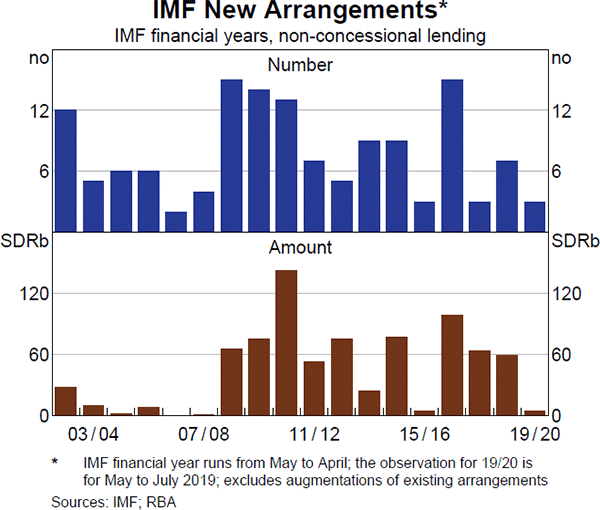
The IMF's overall assessment was positive, indicating that the Australian financial system is fundamentally sound and has been further strengthened since the IMF's previous assessment in 2012. Nonetheless, the IMF made several recommendations to improve current arrangements. CFR agencies have been considering how best to address the IMF's recommendations.
Over the course of the past year, several Reserve Bank staff were seconded to the IMF as short-term experts. One staff member assisted as a technical expert in the FSAP review of a foreign jurisdiction, while another contributed to a training program on payment system oversight for central banks in developing countries.
Executives' Meeting of East Asia-Pacific Central Banks (EMEAP)
Purpose
EMEAP brings together central banks from 11 economies in the east Asia-Pacific region – Australia, China, Hong Kong SAR, Indonesia, Japan, Malaysia, New Zealand, the Philippines, Singapore, South Korea and Thailand – to discuss issues relevant to monetary policy, financial markets, financial stability and payments systems in the region.
Reserve Bank Involvement
The Reserve Bank participates in EMEAP, including at the Governor and Deputy Governor levels. Staff also participate in the EMEAP Working Groups on Financial Markets, Banking Supervision, and Payments and Market Infrastructures, and in meetings of Information Technology (IT) Directors. These groups also maintain close relationships with international institutions such as the IMF and the BIS, through regular dialogue on topical issues.
The Monetary and Financial Stability Committee meeting, which is chaired by the Deputy Governor, provides an important forum for the discussion of current economic and financial market issues of direct relevance to EMEAP members. The two meetings of the Monetary and Financial Stability Committee in 2018/19 focused on the effect of trade tensions on the EMEAP economies and also considered the application of distributed ledger technology, financial stability issues and cybersecurity. Developments in fintech continued to be a major focus of discussions.
The Working Group on Financial Markets focuses on the analysis and development of foreign exchange, money and bond markets in the region. Every second meeting of this group is held in conjunction with the BIS Financial Markets Forum. The group continued its work on developing local currency bond markets, through the Asian Bond Fund Initiative (see the chapter on ‘Operations in Financial Markets’ for details of the Reserve Bank's investments in the Asian Bond Fund). Areas of focus in 2018/19 also included financial benchmark reform and the development of securities lending in Asia.
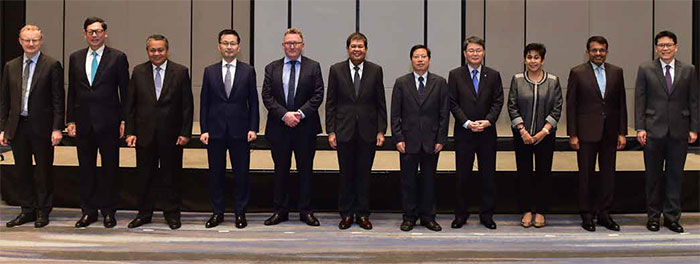
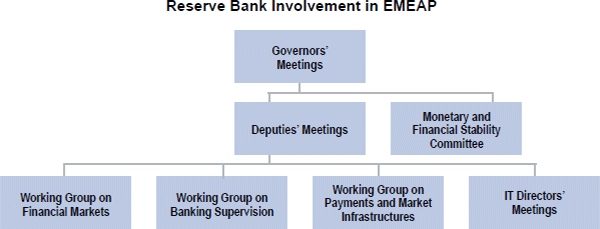
The Working Group on Banking Supervision (which also includes representatives of EMEAP members' prudential regulators, including APRA) is a forum to share experiences about best practices in banking supervision and to discuss issues of relevance in the region. During the past year, members discussed the health of banking systems in the region, financial stability risks, and the implementation of Basel III and other post-financial crisis reforms. The group also discussed issues such as bank culture, the future of banking, bank recovery planning and cyber resilience practices.
The EMEAP Working Group on Payments and Market Infrastructures (formerly the Working Group on Payment and Settlement Systems) is a forum for sharing information and experiences relating to the development, oversight and regulation of retail payment systems and financial market infrastructures. The group discussed a range of issues during the year in review, including:
- the development of fast retail payment systems and other efforts to facilitate the shift towards electronic payments
- initiatives to enhance the security and efficiency of cross-border payments
- developments in crypto-asset markets and emerging regulatory approaches for dealing with the risks associated with crypto-assets
- measures to build resilience and enhance the security of financial market infrastructures, including in response to cyber-risks
- the application of new technologies, such as distributed ledger technology, to payment systems and financial market infrastructures.
The IT Directors' Meeting provides a forum for discussions on developments in IT and its implications for central banks. Recent meetings have focused on IT developments in central banks, including the adoption of cloud technology, cyber security and people management strategies.
Network for Greening the Financial System (NGFS)
Purpose
The NGFS is a group of central banks and supervisors whose purpose is to share best practices, contribute to the development of climate and environment-related risk management in the financial sector, and mobilise mainstream finance to support the transition towards a sustainable economy. As at July 2019, the Network had grown to comprise 42 members and eight observers, across six continents.
Reserve Bank Involvement
The Reserve Bank joined the NGFS in July 2018. The Deputy Governor represents the Bank on the NGFS Plenary, supported by other senior staff. The NGFS has divided its work into three workstreams. The Bank is involved in the Macrofinancial workstream, which aims to develop an analytical framework for assessing climate-related risks to the economy and financial system.
The NGFS produced two reports in 2018/19, including its first comprehensive report. The comprehensive report set out a range of recommendations, including for central banks and supervisors, to support a smooth transition towards a low-carbon economy. The focus of the Macrofinancial workstream over the past year was on measuring the effect of climate change and related risks on macroeconomic variables and financial stability, and identifying scenarios and climate risk indicators for use by central banks and supervisors.
Global Foreign Exchange Committee (GFXC)
Purpose
The GFXC is a forum that brings together central banks and private sector participants in the wholesale foreign exchange market. The committee aims to promote a robust and liquid market. One means by which it does this is through the maintenance of the FX Global Code as a set of principles of good practice for market participants.
Reserve Bank Involvement
The Reserve Bank sponsors the Australian Foreign Exchange Committee (AFXC), one of the 17 regional committees that comprise the membership of the GFXC. The Assistant Governor (Financial Markets) is Chair of the AFXC and the Bank's representative on the GFXC. In June 2019, the Deputy Governor became Chair of the GFXC.
During the year in review, the GFXC met twice, discussing recent developments in market structure and ongoing efforts to expand adherence to the FX Global Code throughout the industry. The GFXC also published reports on the role that disclosures play within the market and on the trading practices of dealers that seek to avoid market risk when transacting with their clients.
Organisation for Economic Co-operation and Development (OECD)
Purpose
The OECD comprises the governments of 36 countries and provides a forum in which governments can work together to share experiences and seek solutions to common problems, including economic and financial ones.
Reserve Bank Involvement
The Reserve Bank's Chief Representative in Europe participates in the OECD's Committee on Financial Markets and the Advisory Task Force on the OECD Codes of Liberalisation.
The OECD Committee on Financial Markets examines a range of financial market issues and aims to promote efficient, open, stable and sound financial systems. The committee's regular discussions with private sector experts in 2018/19 covered environmental, social and governance investing, and open banking. The committee has also continued to review and contribute to the OECD's work on fintech and digitalisation.
The OECD's Codes of Liberalisation are rules-based frameworks to promote the freedom of cross-border capital movements and financial services. All OECD members adhere to the codes. The Advisory Task Force on the OECD Codes of Liberalisation meets periodically to address questions and discuss policy issues related to the codes. It also examines specific measures by individual adherents with relevance to their obligations under the codes. During 2018/19, the task force completed its review of the Code of Liberalisation of Capital Movements.
Technical Cooperation and Bilateral Relations
Australia Indonesia Partnership for Economic Development (Prospera)
The Bank participates in the Australian Government's ‘Prospera’ program, which in 2018/19 brought together the former Government Partnership Fund and the Australia Indonesia Partnership for Economic Governance programs. Under the Prospera Program, the Bank will work with Bank Indonesia, as it did under the Government Partnership Fund program, to promote institutional capacity building. In 2018/19, a range of activities were agreed with Bank Indonesia relating to the payments system, note issue, information technology and statistics. These activities will be undertaken in 2019/20.
Engagement in the South Pacific
The Reserve Bank fosters close ties with South Pacific countries through participation in high-level meetings, staff exchanges and the provision of technical assistance across a wide range of central banking issues.
In November 2018, the Reserve Bank participated in the annual meeting of the South Pacific Central Bank Governors, held in Samoa. A key outcome of the meeting was an agreement among governors to lead the development of a regional ‘Know-Your-Customer’ utility and associated regionally linked payment and settlement arrangements in response to the decline in correspondent banking in the region. In April 2019, the governors met in New Zealand to advance this work.
The Reserve Bank of Australia Graduate Scholarship for Bank of Papua New Guinea officers to undertake postgraduate studies at an Australian university in the areas of economics, finance and computing was first awarded in 1992. The most recent recipient of this scholarship commenced studies at the University of Queensland in July 2018; the previous recipient completed their studies in October 2016.
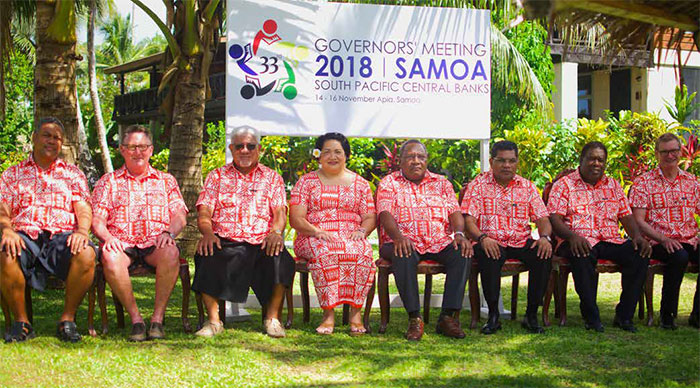
Assistant Governor (Business Services) Lindsay Boulton (far right) with participants at the 2018 South Pacific Central Bank Governors' Meeting, Samoa, November 2018
International visitors and secondments
As in previous years, the Reserve Bank hosted a number of overseas visitors, predominantly from foreign central banks. The visits covered the full range of the Bank's activities and included delegations from China, Finland, Indonesia, Papua New Guinea and South Korea. The Bank also hosted a number of secondees from the Bank of Canada, the Bank of England, the Deutsche Bundesbank and the Reserve Bank of New Zealand. A number of Reserve Bank staff were seconded to other central banks and various international organisations, including the BIS, the Bank of Canada, the Bank of England, the IMF, and the Reserve Bank of New Zealand. These arrangements facilitate a valuable exchange of skills and expertise between the Bank and the broader global economic and financial policymaking community.
Footnote
Further detail on activities of the FSB is reported in the ‘Regulatory Developments’ chapter of the Reserve Bank's semi-annual Financial Stability Review. [1]